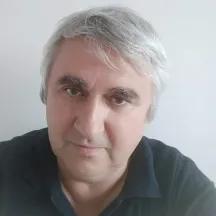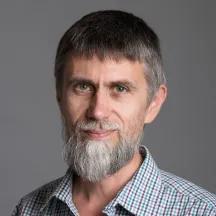RNDr. Petr Šittner, CSc.
Ing. Jiří Hlinka, Ph.D.
Marcela Boháčková
Research in the Condensed Matter Division focuses on the theoretical and experimental investigation of properties of solids, particularly to mechanical, magnetic, dielectric, optical, chemical, electric and transport, based on their crystal and electronic structures. We are mainly interested in changes in the properties of solids derived from the phase transitions (structural, magnetic, dielectric).
We investigate multiferroic, piezoelectric and spintronic materials, liquid crystals, nanostructured metals and alloys, shape memory alloys and composites, magnetic Heusler materials and nanodiamond coatings. Our aim is to discover and develop new tailor-made materials with new properties and functions for novel industrial applications. Although we primarily focus on physical processes in solids taking place in response to external stimuli and investigate their interaction with electromagnetic radiation, our research has significant outreach not only into the field of materials science but also into other disciplines, as for example medicine, robotics, transport or energy with enormous societal impacts.
In accord with the modern trends in material physics and needs of the society, the focus of our research has recently partially shifted to the nanoscale, become highly interdisciplinary and its results become increasingly exploited in engineering applications. Let us name for example modifications of functional properties of superelastic NiTi wires or development of biodegradable metals for applications in medical devices or development of technology for diamond anticorrosion coatings for nuclear fuel cladding.
The research in the Division is organized in 6 research departments containing 12 research groups, 7 central laboratories and 2 joint laboratories with universities.
The division operates modern mechanical testing facility for smart materials research and dedicated laboratories for dielectric, infrared, Raman, terahertz and Mössbauer spectroscopies. As concerns in-house preparation of materials, we make advanced alloys by casting and powder metallurgy routes, we grow large metallic single crystals and crystals for applications in optics, we prepare organic liquid crystals and we also grow thin films and coatings by CVD (nanodiamond) and PVD (metal complexes) techniques.
A significant part of the Division activities is represented by the research in Central Laboratories (LEM, ROTAN, SLMS, GDOES a Chemie) providing research services to the research teams from the FZU as well as to the external users, partially in the frame of the open access to large scale infrastructures. The Central Laboratories operate highly specialized experimental equipment for characterization of structure and physical properties of solids with high potential for exploitation by various research teams which require operation by skilled and highly qualified staff that needs to be continuously trained in novel experimental methods. It includes mainly equipment for characterization of structure and properties of solids using scanning and transmission electron microscopy, x-ray diffraction, spectroscopic and chromatographic methods for evaluation of chemical composition, analytical chemistry methods, and measurements of magnetic and other physical properties of solids in the wide temperature range.
The organization of the research in the Division is based on the balanced combination of the research in specialized laboratories of research teams with regular access to the services of central laboratories. It enables the research teams to perform world-scale competitive research, warranties fair access to a wide range of unique equipment, allows for its efficient operation, facilitates fast development and implementation of novel sophisticated experimental methods and provides equal access of FZU researchers to these equipment and methods.


